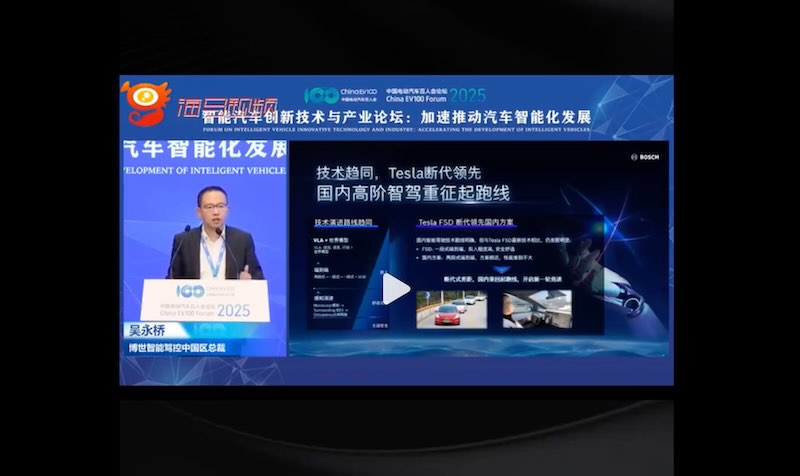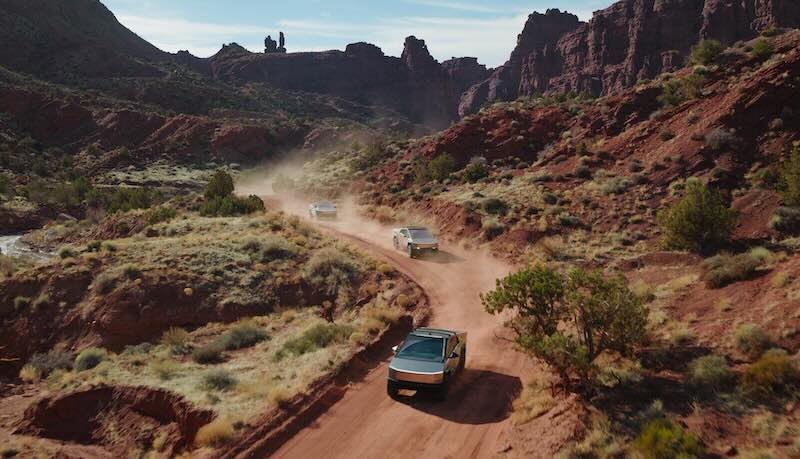At the recent China Electric Vehicle 100 Forum in Beijing, Wu Yongqiao, President of Bosch Intelligent Driving Control Systems China, made waves with his candid assessment of FSD technology. Speaking during his presentation on industry trends, Wu didn’t mince words about the current state of competition.
“Tesla’s unified end-to-end foundational model is at least one to two years ahead of all domestic intelligent driving solutions,” Wu stated after recounting his test drive of Tesla’s Cybertruck at CES this January.

Bosch’s Wu Yongqiao praises Tesla’s FSD after Cybertruck test drive
The executive described being “absolutely blown away” by the six-meter-long vehicle, highlighting three standout qualities that set Tesla’s FSD apart: “extreme confidence, extreme safety, and extreme comfort.” According to Wu, these characteristics remain unmatched by any Chinese intelligent driving system currently on the market.
Wu’s speech, titled “Four Key Drivers Shaping China’s Role in the Global Intelligent Automotive Market,” outlined significant shifts in the industry landscape. He noted that technological approaches are increasingly standardizing around solutions like high-definition maps, mapless navigation, end-to-end models, and vision-language models combined with world models.
This technological convergence has created what Wu calls “the new era of end-to-end AI” – a playing field where companies compete primarily on computing power, algorithms, and data-driven development capabilities rather than fundamentally different approaches.
Despite Tesla’s FSD lead, Wu observed that the performance gap between most intelligent driving systems has narrowed considerably. Most brands now lag only three to four months behind market leaders – a dramatic improvement from the previous rule-based era when technological gaps were much wider.
This acceleration suggests that while Tesla’s FSD maintains a substantial lead, competitors are closing the gap at an unprecedented pace.
Looking ahead, Wu predicted significant changes in how automakers approach intelligent driving development. Within three years, he expects manufacturers of mid-range intelligent vehicles (priced between $12k-$21) to abandon full-stack in-house development due to prohibitive costs.
“Bosch alone invested nearly 2 billion RMB in intelligent driving last year,” Wu revealed, highlighting the enormous financial burden of maintaining large AI teams and developing comprehensive data loops and toolchains.
While Wu believes intelligent driving will soon become a standard feature rather than a brand differentiator, he sees a new battlefield emerging: AI-powered in-car experiences. As autonomous capabilities become commoditized, the in-vehicle artificial intelligence experience will likely determine market winners and losers.
This shift suggests that while Tesla’s FSD might currently drive circles around the competition, the race for automotive AI dominance has only just begun.
Related Post
Tesla’s FSD Debuts in China: Early Users Call Autonomous Driving “Silk-Smooth”
Cybertruck with HW4 Aces FSD Wall Test Where Model Y Failed: Recreate Mark Rober Test
Tesla 2025.2 Update: New Police Encounter Audio Recording Feature Enhances Vehicle Safety
